Who Should Avoid Telma? Contraindications And Precautions
Introduction Managing high blood pressure effectively is crucial to maintaining heart and kidney health. One commonly prescribed medication for this is Telma (Telmisartan), an angiotensin II receptor blocker (ARB) that relaxes blood vessels and lowers blood pressure. Telma is also used to protect kidney function, especially in people with diabetes. While Telma is effective and well-tolerated by many, it is not suitable for everyone. Certain people with specific health conditions should avoid Telma or take special precautions under medical supervision to prevent serious side effects. In this comprehensive blog, we’ll explore who should avoid Telma, what the contraindications are, the necessary precautions, and how you can safely monitor your health while using Telma. We will also highlight how platforms like Quickobook can help you easily book tests and consult doctors online, plus locate the nearest trusted pharmacy to get your medicine on time. What is Telma ? Telma contains the active ingredient Telmisartan, which belongs to a class of drugs called angiotensin II receptor blockers (ARBs). It works by blocking the effects of angiotensin II, a hormone that causes blood vessels to narrow. By relaxing the blood vessels, Telma lowers blood pressure, making it easier for your heart to pump blood. Telma is mainly prescribed for: Hypertension (high blood pressure) Reducing risk of heart attack and stroke in high-risk patients Protecting kidneys in patients with type 2 diabetes and proteinuria Who Should Avoid Telma? Major Contraindications 1. Pregnant Women Must Avoid Telma Telma is strictly contraindicated during pregnancy, particularly during the second and third trimesters. The use of Telma during pregnancy can cause serious fetal harm including: Impaired kidney development Low amniotic fluid levels (oligohydramnios) Skull and bone malformations Fetal or newborn death Pregnant women or those planning pregnancy should immediately inform their healthcare provider before taking Telma. Safer alternatives are typically recommended during pregnancy. 2. Patients with Severe Liver Disease Should Avoid or Use Cautiously Since Telmisartan is processed by the liver, patients with severe hepatic impairment or cholestasis (blockage of bile flow) should avoid Telma or use it only under close supervision. Impaired liver function can cause accumulation of the drug in the body leading to toxicity. 3. Severe Kidney Impairment or Dialysis Patients Need Careful Evaluation Though Telma often helps protect kidney function in mild to moderate cases, those with severe kidney failure or on dialysis require special evaluation. Improper use can worsen kidney function or cause electrolyte imbalances. If you fall under this group, regular kidney function monitoring is essential, and dosing adjustments may be required. 4. Allergic Reactions to Telmisartan or ARBs Anyone who has experienced allergic reactions to Telmisartan or any other ARB drug — such as rashes, swelling, itching, or difficulty breathing — should avoid Telma altogether. Severe allergic reactions like anaphylaxis can be life-threatening and require immediate medical attention. 5. Concurrent Use of Aliskiren in Diabetics or Kidney Disease Patients Using Telma in combination with Aliskiren (a direct renin inhibitor) is contraindicated in patients with diabetes or moderate to severe kidney impairment (eGFR < 60 ml/min/1.73 m²). This combination increases the risk of: Hyperkalemia (dangerously high potassium levels) Hypotension (very low blood pressure) Kidney failure Always inform your doctor about all medications you are taking to avoid such risky drug interactions. 6. Patients with Hypotension or Low Blood Pressure If you have naturally low blood pressure or episodes of hypotension, Telma may further lower your blood pressure excessively, leading to dizziness, fainting, or shock. Use Telma cautiously under medical supervision in such cases. Important Precautions to Take When Using Telma If your doctor prescribes Telma, the following precautions can help you avoid complications and maximize benefits. 1. Regularly Monitor Your Blood Pressure Because Telma lowers blood pressure, regular monitoring is critical to ensure it doesn’t drop too low. Sudden drops in blood pressure can cause dizziness, fainting, or falls — especially when standing up quickly (orthostatic hypotension). If you experience these symptoms, contact your healthcare provider. 2. Keep Potassium Levels in Check Telma can cause increased potassium levels in the blood (hyperkalemia), which can disrupt your heart rhythm and become dangerous. Avoid potassium supplements or potassium-rich salt substitutes unless your doctor approves. Periodic blood tests are necessary to monitor potassium and kidney function, especially if you have existing kidney problems. 3. Monitor Kidney Function Even though Telma protects kidneys in many cases, people with pre-existing kidney disease need regular monitoring to avoid worsening kidney damage. Watch for swelling, reduced urination, or sudden weight gain. 4. Stay Hydrated and Avoid Dehydration Conditions causing dehydration such as vomiting, diarrhea, or excessive sweating can increase the risk of low blood pressure and kidney injury while on Telma. Maintain good hydration and seek medical help if dehydration symptoms appear. 5. Inform Your Doctor About All Other Medications Telma interacts with several medicines, including: Non-steroidal anti-inflammatory drugs (NSAIDs) like ibuprofen Diuretics (water pills) Lithium (used in psychiatric disorders) Other blood pressure medicines Potassium supplements Inform your healthcare provider about all medications and supplements you use to prevent adverse interactions. 6. Use with Caution in Elderly Patients Older adults may be more sensitive to the effects of Telma and require closer monitoring for side effects and blood pressure control. 7. Report Symptoms of Heart Problems Promptly Patients with heart failure or certain heart valve conditions should use Telma under strict supervision. Low blood pressure or changes in blood flow may worsen symptoms. How to Book Tests and Consult Doctors for Safe Telma Use Safe use of Telma requires regular health monitoring including: Blood pressure checks Kidney function tests (serum creatinine, eGFR) Blood potassium levels You can book tests easily via platforms like Quickobook, which connects you with trusted diagnostic labs and health centers near your location. Quickobook also helps you book appointments with specialists like cardiologists, nephrologists, and general physicians to discuss Telma use and monitor your health closely. After consultations, you can find a nearby pharmacy through Quickobook to get your prescribed medicines quickly and reliably, sometimes with home delivery options. Signs to Watch for While Taking Telma If you experience any of the following symptoms, seek medical attention immediately: Severe allergic reactions: swelling, rash, difficulty breathing Persistent dizziness or fainting Swelling in legs, ankles, or hands Sudden unexplained weight gain Decreased urine output Irregular heartbeat or palpitations Early reporting of these signs helps prevent serious complications. Can Children Use Telma? Telmisartan is generally not recommended for children under 18 except under specialist supervision. Pediatric dosing and safety require expert evaluation. How to Use Telma Safely? Take Telma exactly as prescribed, usually once daily, with or without food. Never skip doses or stop the medication abruptly without medical advice. Keep all follow-up appointments for testing and monitoring. Avoid potassium-rich foods and supplements unless approved by your doctor. Inform your doctor about any side effects or new symptoms immediately. Summary: Is Telma Safe for You? Telma is a powerful medication for controlling high blood pressure and protecting heart and kidney health. However, it should be avoided by: Pregnant women Patients with severe liver or kidney disease People allergic to Telmisartan or ARBs Patients taking aliskiren with diabetes or kidney impairment Those with very low blood pressure For others, regular health monitoring and adherence to precautions ensure effective and safe treatment. Frequently Asked Questions (FAQs) Q1: Can I use Telma if I am pregnant? No, Telma is unsafe during pregnancy and should be avoided to protect the fetus. Q2: How can I book tests to monitor Telma’s effects? You can conveniently book tests via Quickobook, which partners with accredited labs. Q3: Where can I consult doctors for Telma prescription and monitoring? Quickobook helps you find and book appointments with trusted doctors online or offline. Q4: What side effects should I watch for? Dizziness, swelling, allergic reactions, and irregular heartbeat require urgent medical attention. Q5: Can I stop Telma once my blood pressure improves? Never stop Telma without consulting your doctor to avoid blood pressure rebound. For smooth healthcare access, use Quickobook to book tests, consult doctors, and find a trusted pharmacy nearby for your medication needs. Managing your health has never been easier!
Read More
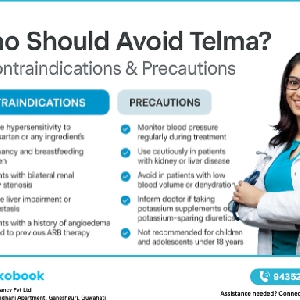
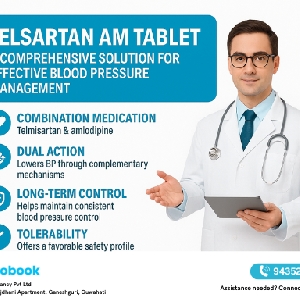
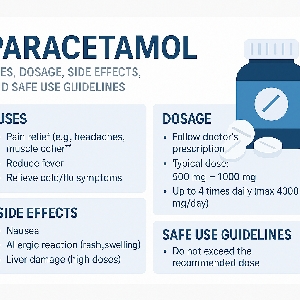
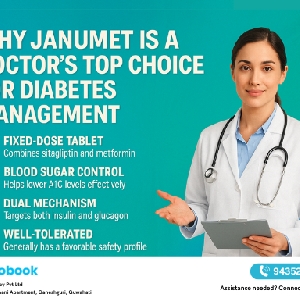

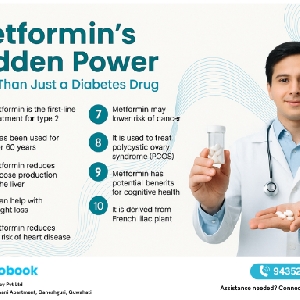
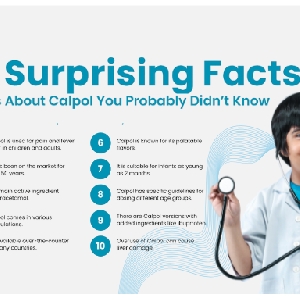
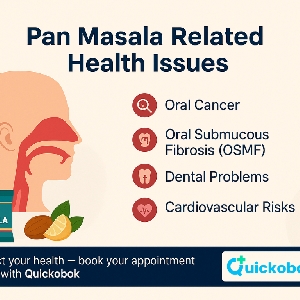

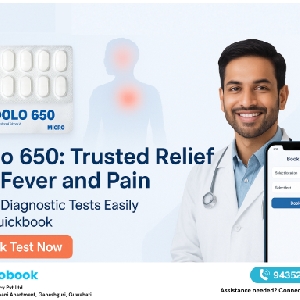

 Play Store
Play Store